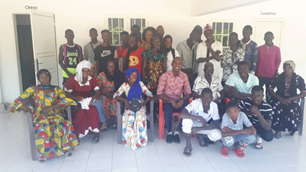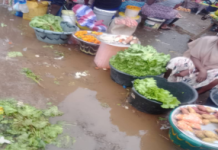By Nelson Manneh
The Chief Executive Officer (CEO) of Aspuna Company, Maria-Yassin Jah, said their group aims to unlock Africa’s abundant but underutilized agricultural wealth to help eradicate hunger, poverty, and unemployment to secure food security.
Aspuna is a name derived from the English word ‘Aspire’ and the Wolof word ‘Aduna’, which means ‘World’. The very combination of these words reflects the group’s ambition to become the leading social impact commodity trading house and expand its activities on a global scale.
CEO Jah said they have already proven that this approach works in The Gambia as they are currently employing thirty-five people, who produced products every season, albeit at a reduced rate in 2020 due to the pandemic.
The CEO made these statements in a press release issued by the Aspuna Group regarding the company’s plans in 2021.
CEO Jah said initially, the company focused on Africa and the soft markets, but they now offer agro-processing trading and advisory services to public and private organizations, wishing to extend African processing capacities too.
“Now, with operating centres in Nigeria and Tanzania and more soon to announce, this pioneering business has launched its first-ever apprenticeship program in partnership with the German GIZ in The Gambia. Apprenticeship schemes were always part of the Aspuna business model and will ensure the sustainability of the business’s pioneering approach to agro-processing and commodities trading,” she said.
Establishing its first agro-processing plant in The Gambia in 2017, Aspuna Group CEO said their intentions were to enable small-scale farmers to transform cassava into starch (tapioca) with a quality so far unrivalled in Africa.
“Selling processed cassava would keep the value of these farmers’ crops within their communities, in line with the government’s World Bank-backed vision and strategy,” she said..
Madam Jah said Aspuna Group partnered with German GIZ to develop and deliver an apprenticeship scheme too, in a bid to ensure the sustainability of this pioneering model of agro-processing and commodities trading.
“In addition, we have trained six hundred and twenty-seven (627) youth farmers, and are now adding thirty-five new apprentices to the team,” she said.
Madam Jah said they are now expanding their tentacles, having proven that the Aspuna concept worked in The Gambia, setting up new entities in Nigeria and Tanzania, where their processing plants are already in operation as well as in several other sub-Saharan countries. She said news about their set ups will be announced soon.
“From the start, our intention had always been to set up apprenticeship schemes within the communities we operate and we are all so proud to be kicking off 2021 with our first such scheme,” Ms. Jah added.
She said the scheme, which saw apprentices selected via an application process and interviewed, will ensure 35 community members receive practical, technical and literacy training.
The practical training will include the fundamental principles of climate-smart and sustainable agriculture, while technical training will include modules on the processing, machinery handling and manufacturing processes.
Madam Jah said literacy training will support all apprentices, including some who were unable to attend school beyond primary years, to develop reading and writing skills.
“Aspuna Group promotes a code of conduct in keeping with our values, which can be summarized as take responsibility, be the best, respect each other, and be bold and diverse. Apprentices will be encouraged to live these values… In fact, because the application the process was designed with our values in mind, we’re delighted to welcome equal numbers of males and females, victims of human trafficking and individuals with disabilities to the growing Aspuna team,” Jah said.



















